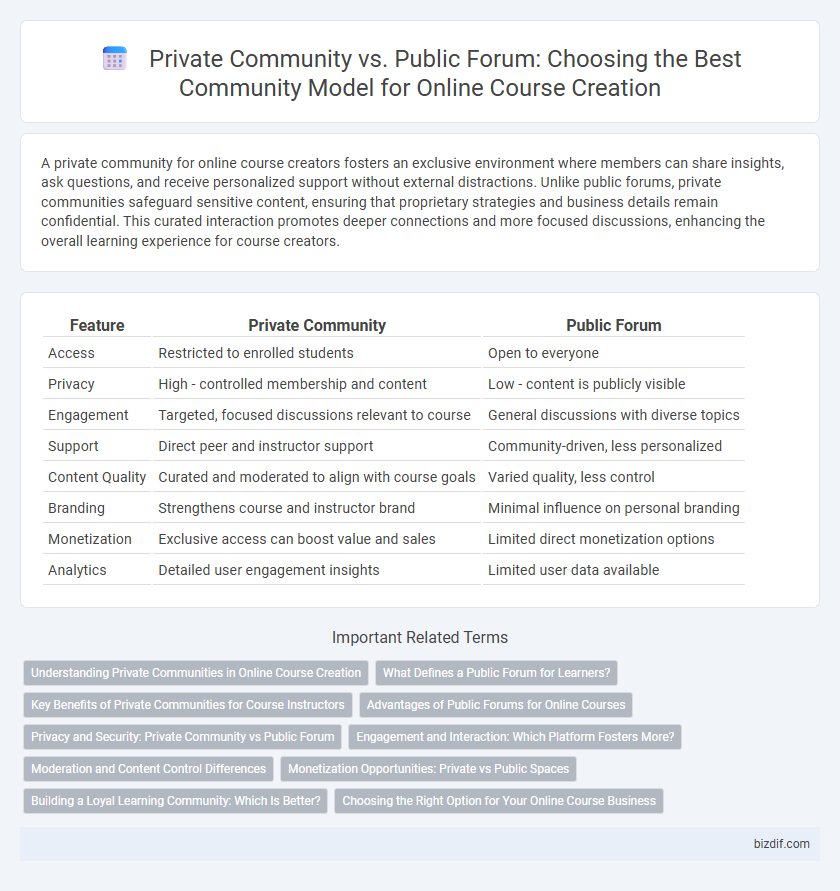A private community for online course creators fosters an exclusive environment where members can share insights, ask questions, and receive personalized support without external distractions. Unlike public forums, private communities safeguard sensitive content, ensuring that proprietary strategies and business details remain confidential. This curated interaction promotes deeper connections and more focused discussions, enhancing the overall learning experience for course creators.
Table of Comparison
| Feature | Private Community | Public Forum |
|---|---|---|
| Access | Restricted to enrolled students | Open to everyone |
| Privacy | High - controlled membership and content | Low - content is publicly visible |
| Engagement | Targeted, focused discussions relevant to course | General discussions with diverse topics |
| Support | Direct peer and instructor support | Community-driven, less personalized |
| Content Quality | Curated and moderated to align with course goals | Varied quality, less control |
| Branding | Strengthens course and instructor brand | Minimal influence on personal branding |
| Monetization | Exclusive access can boost value and sales | Limited direct monetization options |
| Analytics | Detailed user engagement insights | Limited user data available |
Understanding Private Communities in Online Course Creation
Private communities in online course creation offer a secure, exclusive environment where learners engage directly with instructors and peers, fostering deeper connections and personalized support. These communities enhance course retention rates by promoting active participation and creating a safe space for sharing insights and feedback. Maintaining privacy controls and membership moderation ensures a focused learning experience, reducing distractions common in public forums.
What Defines a Public Forum for Learners?
A public forum for learners is defined by its open access, allowing anyone interested to join, participate, and share knowledge without restrictions. These forums encourage diverse perspectives, fostering broad discussions and crowd-sourced problem-solving among a wide audience. Transparency and accessibility are key features, enabling learners to benefit from collective experiences and publicly available resources.
Key Benefits of Private Communities for Course Instructors
Private communities foster exclusive interaction, allowing course instructors to build stronger connections with learners through personalized support and tailored feedback. These controlled environments enhance engagement by limiting distractions and creating a safe space for sharing, which leads to higher completion rates and improved course satisfaction. Furthermore, private communities enable instructors to gather valuable insights and prompt discussions directly aligned with course content, optimizing the learning experience.
Advantages of Public Forums for Online Courses
Public forums foster vibrant interaction and diverse perspectives by allowing all participants in online courses to engage openly, enhancing collaborative learning and peer support. They increase course visibility and attract new learners through accessible content, boosting enrollment and community growth. Open accessibility also encourages continuous knowledge sharing and resource exchange, which enriches the overall educational experience.
Privacy and Security: Private Community vs Public Forum
Private communities offer enhanced privacy by restricting access to verified members, reducing exposure to unwanted users and data breaches. Public forums lack stringent access controls, increasing vulnerability to spam, trolling, and unauthorized data sharing. Secure private communities leverage encryption and strict membership protocols to protect sensitive course materials and foster a safe learning environment.
Engagement and Interaction: Which Platform Fosters More?
Private communities foster higher engagement and interaction in online courses by creating a secure, exclusive environment where members feel comfortable sharing ideas and asking questions. Public forums attract a broader audience but often result in lower-quality interactions due to noise and less personalized connections. Data shows private groups increase active participation rates by up to 60%, enhancing learning outcomes and peer support.
Moderation and Content Control Differences
Private communities offer robust moderation tools enabling course creators to enforce strict content guidelines and maintain a focused learning environment. Public forums present limited moderation options, often leading to increased off-topic discussions and reduced content control. Effective moderation in private communities ensures higher-quality interactions and sustained engagement within the online course ecosystem.
Monetization Opportunities: Private vs Public Spaces
Private communities offer exclusive monetization opportunities through subscription fees, premium content, and targeted member engagement, fostering higher customer lifetime value. Public forums generate revenue primarily via advertising, sponsored posts, and broad affiliate marketing, leveraging large, diverse audience reach. The choice between private and public spaces significantly impacts monetization strategies by balancing exclusivity with scale and engagement depth.
Building a Loyal Learning Community: Which Is Better?
A private community fosters a loyal learning environment by offering exclusive access, personalized interactions, and controlled content, enhancing member engagement and trust. Public forums, while offering broader visibility and diverse perspectives, often lack the intimate and secure atmosphere needed to build strong learner relationships. For online course creators aiming to cultivate a dedicated and supportive learning community, private communities provide the optimal balance of exclusivity and collaboration.
Choosing the Right Option for Your Online Course Business
Selecting a private community for your online course fosters exclusive interaction, enhances member engagement, and maintains a focused learning environment. Public forums offer broader visibility and diverse perspectives but may dilute course content quality and increase distractions. Prioritize your target audience's needs and course goals to determine whether controlled access or open dialogue best supports your online course business growth.
Private Community vs Public Forum Infographic

 bizdif.com
bizdif.com